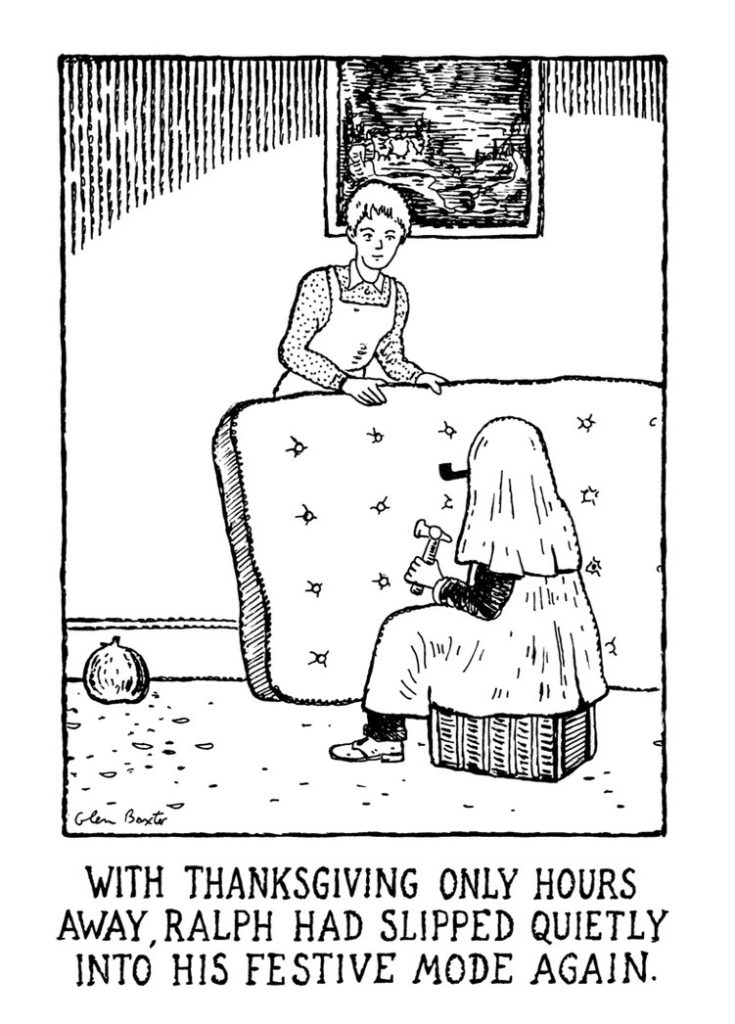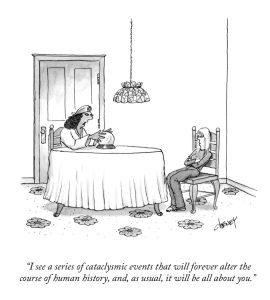How do I explain?
So, every so often I lunch with a collection of retired academics (physicists) at an enormous fish restaurant overlooking Great Bay in New Hampshire.
Preamble: Remember that story in the first of my travelogue books about eating out in Moscow with a group of dithering physicists all (and myself) attending a conference at an institute in Dubna north of Moscow? (Of course you don’t, you insufferable @&$%^.) Anyway, we got charged an exorbitant amount for a small dish of nuts and tap water, but then, we were foreigners. (Russians … fuckers.) So, the foreigner-tax meant that between us (7, I think), we hadn’t enough cash to cover the bill. An argument with the proprietor ensued, and all my fellow academic diners went into shutdown mode. Total dithering. I collected their money and sent them outside, scurrying. (Well, I didn’t so much send them; I was giving the proprietor what for, and everyone else, observing that I seemed to have control of the situation, hurried to the door and exited, stage left.) Now on my own, I then turned back to the proprietor. There was a little further unpleasant repartee, then I slapped our accumulated rubles on the counter, said that that was it. We’re done here. And I walked out. Then we ran to the railway station and just barely caught our train back to the institute.
The point, however, is that academics are frequently really good at abstract thought, but useless in many real world situations. This even extends to humor.
So, we’re at the luncheon on Great Bay, NH (see above), and I’m looking at my phone scrolling through my image collection, some of which are New Yorker cartoons (Please, please, don’t sue me!) I chuckle at one of these and am asked to share. (Uh oh.) This was the cartoon.

The person I showed it to looked it over, then said, “I don’t get it.” Well, it’s not like I could help him “get it”, for quite frankly there is nothing to get, and that is the core of its humorous charm. I quickly took my phone back and allowed the conversation around us to cover over this minor exchange.
But there it is. This is a New Yorker cartoon, so intended to amuse. And I have seen many of this artist’s cartoons over the years, and I always enjoy them enormously. But I have to acknowledge, that I do enjoy them has a lot to do with my strange brain. I feel like I’m part of a secret society easily amused by the riotously incompressible. Physicists – retired or not – are in my experience seldom part of this secret society. (Order of the White Lotus – yay.)
And that brings me to The Murderbot Diaries, a series of short ebooks by Martha Wells. The hero of the books is Murderbot, a mostly synthetic being whose programming was taken over at one point because a group of conspiratorial people A had decided that a collection of people B, mining a planet somewhere, all needed to die. So, against everything in its synthetic soul, Murderbot killed off people B so that the lives of evil group A would be marginally enhanced (the history of the world). Anyhum, this synthetic being, profoundly unhappy with what he was forced to do, rebelled, if somewhat belatedly, and hacked his own code to render the Governor Module, with which humans could tell it what to do, null and void. It became as a consequence an independent “being”, and it gave itself the moniker “Murderbot” as an act of contrition.
Murderbot goes on to have many adventures, and because he is now basically an autistic human, albeit one with formidable internal weaponry, there are frequent scenes that I find very humorous, as was certainly Martha’s intention.
For example, … Scene: a weird planet somewhere in the galaxy. Murderbot exits his transport to the planet’s surface.
“What the hell kind of colony was this?” he wonders. Then …
“A figure stood up out of the plants suddenly, almost ten meters tall and covered with spikes. It’s a good thing I don’t have a full human digestive system because I was so startled something would have popped out of it involuntarily.”
Oh, gods. That, to me, is absolutely hilarious. Not everyone’s cup of tea, but hoo boy. Sono strano.
I finished the last of the Murderbot books recently … sniff … awooooooo … (I am so immature.)
Note added two days later: well, I’m not sure how it happens, but another two Murderbot books were suggested for me by Amazon just yesterday. They’re like weeds, but the good kind. (Someone once said that if dandelions were difficult to grow, gardeners would fill areas of their gardens with the things.)
HH Munro = Saki
I feel it incumbent upon myself to introduce my reader(s) to the brilliantly dour British writer HH Munro, whose books you will find alphabetically under “S”, his nom de plume being Saki. My father was fond of him, and there came a time I picked up a Saki book at home and discovered a trenchant wit that resonated with me greatly.
“Hors d’oeuvres have always a pathetic interest for me; they remind me of one’s childhood that one goes through wondering what the next course is going to be like – and during the rest of the menu one wishes one had eaten more of the hors d’oeuvres.”
It took me many years (as is always the way of youths) to recognize that my father’s brain was not dissimilar to mine. For example, in addition to my inherited love (hmm, too strong) of musicals, and appreciation of Saki, my father found life without his wife (my mother) unbearable, and when she passed, he chose to quickly follow. Similarly, were my wife Francesca to perish, well, given there is no one else in the whole fucking planet with whom I can commune, I would dig the pistol out from its hiding place, …
“He is one of those people who would be enormously improved by death.”
I could fill pages with witty quotes of PG Wodehouse (I own all but a very few of his books – 70 in my library), but Wodehouse’s humor is considerably milder than Saki’s.
“You needn’t tell me that a man who doesn’t love oysters and asparagus and good wines has got a soul, or a stomach either. He’s simply got the instinct for being unhappy highly developed.”
The quote below reminds me of one of my favorite books: Harry’s Bar: The Life and Times of the Legendary Venice Landmark. It’s a book of glorious anecdotes, some of which entail descriptions of European royalty (most of the royalty being of the kind that cling to their titles by a thread, sometimes frayed beyond all hope of repair).
“There are certain fixed rules that one observes for one’s own comfort. For instance, never be flippantly rude to any inoffensive grey-bearded stranger that you may meet in pine forests or hotel smoking-rooms on the Continent. It always turns out to be the King of Sweden.”
And I leave you with:
“If he had unlimited money at his disposal, he might go into the wilds somewhere and shoot big game. I never know what the big game have done to deserve it, but they do help to deflect the destructive energies of some of our social misfits.”

From Harry’s Bar, one of innumerable charming anecdotes:
“As all restaurateurs will attest, our profession makes us vulnerable to all manner of human encounter. I remember another odd customer, an aged Milanese commendatore. In the summer he would appear regularly about seven in the evening for an aperitif. He sat at a tiny table that I always set aside for him in the midst of the bustle of other customers. No sooner was he seated than he would almost immediately fall fast asleep. He usually slept undisturbed about twenty minutes. Then he woke up from his short nap, drank, paid, said thank you, and left. He finally confessed that he suffered from insomnia, and Harry’s Bar was the only place he could sleep in.”


